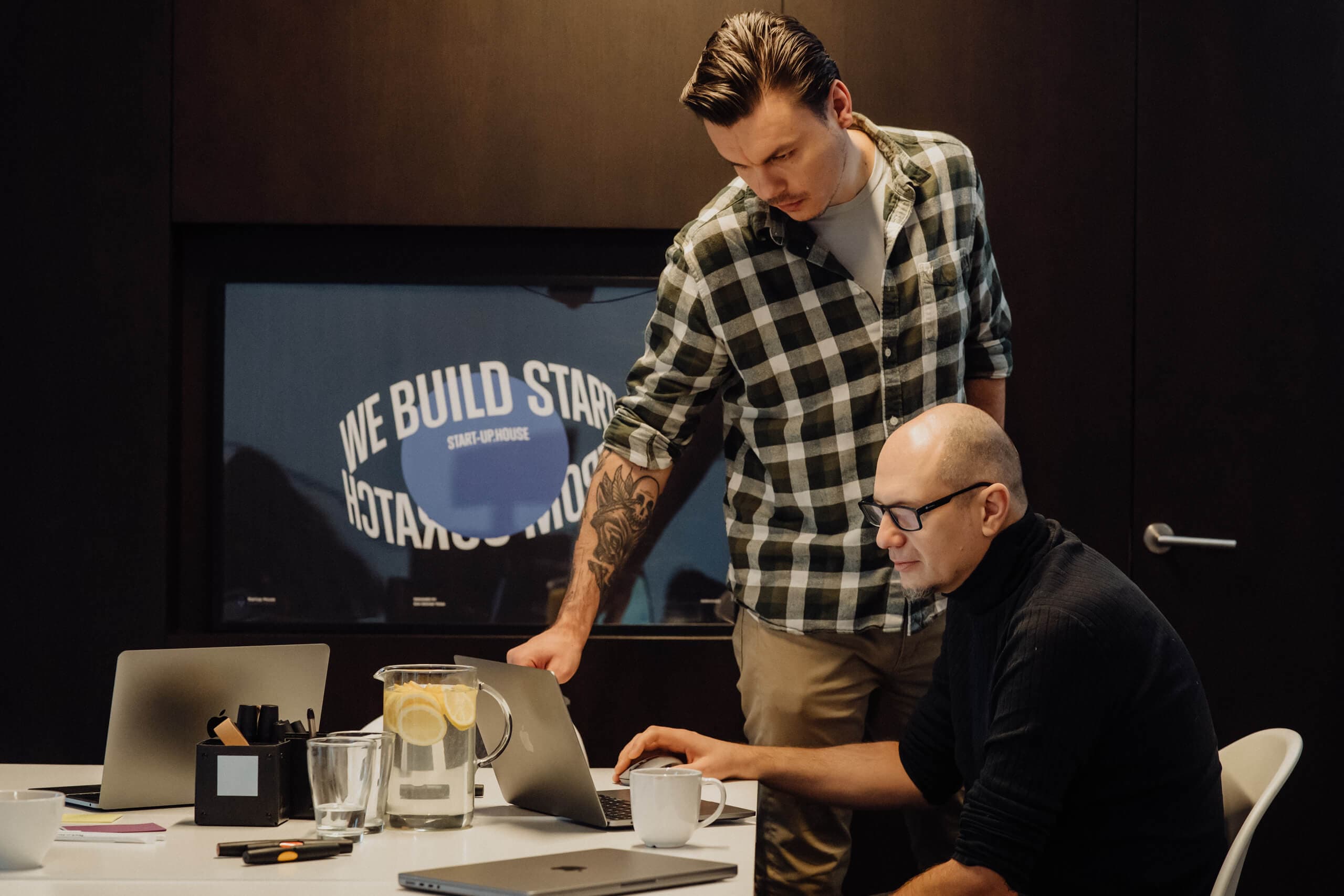Blockchain Application Development: A Comprehensive Guide by Startup House

Marek Majdak
Nov 08, 2022・5 min read
Table of Content
What is Blockchain?
What is Blockchain Application Development?
Benefits of Blockchain Applications
Key Industries for Blockchain Applications
**Blockchain App Market Overview**
Examples of Blockchain Technology in Practice
How to Build a Blockchain App
Programming Languages Used in Blockchain Development
How to Integrate a DApp With Your Business
Types of Blockchain Developers
Roles and Responsibilities of Blockchain Developers
Salary and Future
Conclusion
FAQs
What is Blockchain?
Blockchain, often described as a digital ledger, records transactions across multiple computers to ensure that each record is secure and transparent. This distributed ledger technology has revolutionized the tech world with its immutable records and decentralized nature. The technology behind cryptocurrencies like Bitcoin, blockchain's potential extends well beyond financial applications, paving the way for myriad blockchain application development opportunities.
What is Blockchain Application Development?
Blockchain application development is the process of creating apps that utilize the blockchain system. This encompasses decentralized apps (often called DApps), smart contracts, and more. From health to finance and supply chain management, blockchain apps are revolutionizing industries with enhanced transparency, security, and efficiency.
Benefits of Blockchain Applications
Understanding the array of benefits offered by blockchain applications is pivotal:
Public Verification: All transactions on the blockchain network are public, ensuring validation by network members and building trust.
Transparency: Alterations in a blockchain need approval from participants, making data transparent and reliable.
Privacy: Blockchain applications uphold users' privacy by providing controlled access and ensuring sensitive data remains confidential.
Integrity: Every transaction is encrypted and linked to the preceding transaction, ensuring data integrity and reducing the risk of fraud.
Easy Transactions: Blockchain apps simplify and expedite transactions, often eliminating intermediaries, leading to efficient peer-to-peer interactions.
Great Cryptocurrency Exchange Experience: The blockchain provides a secure and streamlined environment for exchanging cryptocurrencies.
High Security: Due to cryptographic encryption, blockchain apps offer unparalleled security against malicious attacks and fraud.
Key Industries for Blockchain Applications
Blockchain technology is not just limited to cryptocurrency. It's transforming various sectors:
Finance: With decentralized storage, transactions become more transparent and secure.
Supply Chain Management: It enhances traceability and reduces operational costs.
Healthcare: Securing patient records and streamlining medical processes.
Real Estate: Simplifying land registry and property transactions.
**Blockchain App Market Overview**
The blockchain app market is experiencing exponential growth. Driven by the benefits of decentralization, transparency, and enhanced security, various industries are integrating blockchain technology. The blockchain app market overview suggests a thriving ecosystem with immense potential for innovators and investors.
Examples of Blockchain Technology in Practice
Numerous enterprises are capitalizing on blockchain technology:
Spotify: Utilizing blockchain to manage copyrights and artist royalties.
Warranteer: A solution that allows customers to access product warranties digitally.
IBM Blockchain: Offering transparency in the supply chain management domain.
MedRec: Safeguarding medical records using blockchain.
Securrency: A finance-focused platform leveraging blockchain for compliance and security.
How to Build a Blockchain App
Embarking on the journey of blockchain app development requires meticulous planning:
Step 1: Clarify Your Idea: Understand your objectives and how blockchain can address them.
Step 2: Do Competitor Research: Gain insights from existing solutions and identify gaps.
Step 3: Analyze Your Options: Evaluate the blockchain platforms suitable for your requirements.
Step 4: Choose a Platform: Select the most popular blockchain platforms like Ethereum or Hyperledger.
Step 5: Start the Development Process: Engage with experienced blockchain developers, ensure they're equipped with the necessary development tools, and initiate the development phase.
Step 6: Deploy and Maintain Your DApp: Post development, deploy your decentralized app and ensure regular maintenance for optimum performance.
Programming Languages Used in Blockchain Development
Blockchain development isn't confined to a single programming language. From Solidity for Ethereum smart contracts to C++ for Bitcoin, various programming languages play a pivotal role in blockchain application development.
How to Integrate a DApp With Your Business
Integrating a DApp requires understanding its applicability:
Transactions: Simplifying transaction processes with blockchain adoption.
Supply Chain Management: Enhancing traceability and accountability in the supply chain.
Authentication: Using blockchain for user authentication and data security.
Cloud Storage: Secure and decentralized storage solutions using blockchain.
Types of Blockchain Developers
In the blockchain ecosystem, developers play varied roles:
Core Blockchain Developers: They focus on the architecture and design of the blockchain system.
Blockchain Software Developers: They build apps based on the blockchain framework.
Smart Contract Developers: They create smart contracts, ensuring they're error-free and optimized.
Roles and Responsibilities of Blockchain Developers
A blockchain developer wears multiple hats:
- Designing blockchain protocols.
- Designing network architecture.
- Developing smart contracts.
- Ensuring the security of the entire system.
- Collaborating with the development team for full-stack blockchain development.
Salary and Future
Blockchain developers are among the most sought-after professionals. The average salary of a blockchain developer is competitive, and with the growing demand, this trend is expected to persist.
Conclusion
Blockchain application development is revolutionizing various industries, offering solutions that are transparent, secure, and efficient. Whether you aim to explore blockchain for personal curiosity, integrate it into your business, or pursue a career in blockchain development, the horizon is promising. As the blockchain network continues to grow and evolve, so does the potential for innovative applications and solutions. For those willing to embrace this technology, the future is decentralized and brimming with opportunities.
FAQs
Navigating the world of blockchain might bring up numerous queries. Let’s delve into some common questions:
What is a blockchain app?
A blockchain app or DApp is a decentralized application that runs on a blockchain network, ensuring transparency and security.
Why is blockchain important for businesses?
Blockchain provides enhanced security, transparency, and efficiency, making transactions and data storage more trustworthy.
Which industries can benefit from blockchain apps?
Almost all sectors, including finance, healthcare, supply chain, entertainment, and more, can reap the benefits of blockchain.
How is Spotify using blockchain?
Spotify employs blockchain to manage copyrights and artist royalty payments more efficiently.
What are the essential steps in developing a blockchain app?
Clarify your idea, research competitors, analyze platforms, choose a suitable one, begin development, and then deploy and maintain your DApp.
Which programming languages are popular in blockchain development?
Solidity, C++, and Python are among the top languages used in blockchain development.
What's the difference between a core blockchain developer and a blockchain software developer?
Core developers focus on the system's design and architecture, while software developers build applications based on this framework.
How do smart contracts work in blockchain?
Smart contracts are self-executing contracts with the agreement directly written into code, ensuring automated and secure transactions.
What's the average salary of a blockchain developer?
The salary varies by region and experience, but due to high demand, they generally command competitive salaries.
Is a background in coding essential to become a blockchain developer?
While understanding theoretical aspects is possible without coding, building blockchain solutions necessitates coding proficiency.
Are blockchain transactions truly anonymous?
Transactions are pseudonymous; they can be traced to a digital address, not directly to an individual.
How secure are blockchain networks?
Due to their decentralized nature and cryptographic techniques, they are highly secure, though not entirely immune to attacks.
What are the potential risks of blockchain?
Potential risks include technological vulnerabilities, regulatory challenges, and scalability issues.
Can blockchain be integrated into existing systems?
Yes, with the right approach and expertise, blockchain can be integrated into current systems.
What's the future of blockchain technology?
The technology's future is promising, with potential applications in various industries, making processes more transparent and secure.
How does blockchain enhance supply chain management?
It offers increased traceability, transparency, and efficiency, allowing every product's journey to be tracked securely.
What challenges might one face while developing a blockchain app?
Challenges include scalability, interoperability with existing systems, regulatory concerns, and technological vulnerabilities.
How long has blockchain technology been around?
Blockchain technology, as we know it, started with the introduction of Bitcoin in 2009.
How do decentralized apps differ from traditional apps?
DApps are built on a decentralized network, ensuring no single entity has control, making them transparent and resistant to censorship.
Why are smart contracts significant in the blockchain domain?
They automate transactions, ensuring terms are met without intermediaries, thus enhancing speed and trustworthiness.
Digital Transformation Strategy for Siemens Finance
Cloud-based platform for Siemens Financial Services in Poland


You may also like...

Natural language processing in finance
Most finance teams spend hours combing through reports, news, and data. Natural language processing (NLP) changes that by turning massive amounts of text into clear, actionable insights.
Alexander Stasiak
Oct 23, 2025・7 min read

AI in regulatory compliance
Explore how artificial intelligence is redefining compliance, risk management, and efficiency across industries.
Alexander Stasiak
Nov 26, 2025・8 min read

Robotic Process Automation in Finance
Robotic Process Automation (RPA) in finance handles repetitive tasks with precision, freeing your team to focus on strategy. Learn how this technology reshapes financial operations and drives smarter, faster performance.
Alexander Stasiak
Oct 30, 2025・9 min read
Let’s build your next digital product — faster, safer, smarter.
Book a free consultationWork with a team trusted by top-tier companies.








